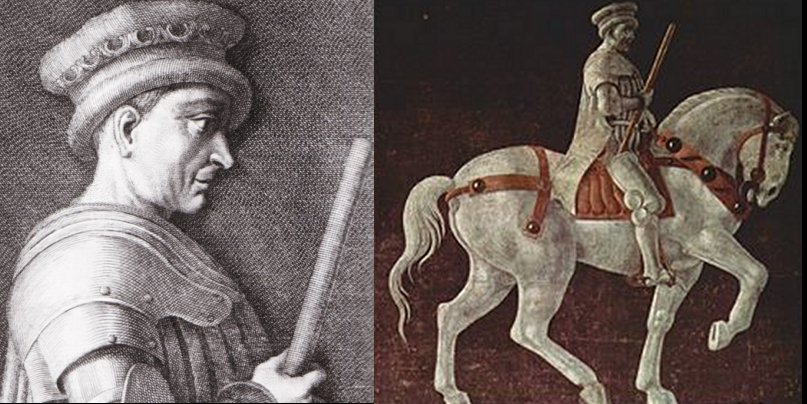John Hawkwood ‘John Sharp’: Feared, English Mercenary And His White Company In 14th Century Italy
A. Sutherland - AncientPages.com - John Hawkwood was widely known in Europe eight hundred years ago. He was an English military in the Hundred Years' War (1337 to 1453) and a mercenary operating in Italy, where he was known as Giovanni Acuto.
Hawkwood was born about 1320 in Sible Hedingham in Essex, England. His father was a leather tanner and landowner.
Left: Engraving representing John Hawkwood. Public Domain; Right: Funerary Monument to Sir John Hawkwood by Paolo Uccello (1436). Public Domain
The family was not wealthy, and when his father died, John inherited only a sack of wheat and 20 pounds. Such a legacy was not enough to make a career, so he searched for new opportunities to improve his life.
John Hawkwood – Knight And Leader Of The White Company
At that time, Edward III (1312–1377) was King of England, celebrated for his military successes and restoring royal authority after the devastating reign of his father, Edward II.
Edward III regularly needed new soldiers in the Hundred Years' War with France; John Hawkwood took this opportunity and found work as an archer in Edward's troops. He soon showed his skill on the battlefield.
After the Battle of Poitiers (1356), Hawkwood joined the White Company, an ill-famed group of mercenaries. With them, he entered Italy in 1361; only three years later, he became the company's commander. He was knighted, but it was never precisely specified when and by whom (though the Black Prince and the English King were suggested)
He Was A Leading Figure In Italian Warfare
Hawkwood was one of the leading figures in Italian warfare for the next thirty years. As the leader of the White Company, he specialized in archery and sneaky attacks.
After arriving in Italy, he fought for several factions, such as the Pope, Milan, and Florence. He served as a mercenary and was first the Pope and then various lords.
In his book 'Mercenaries and their Masters,' Michael Mallett writes that Hawkwood was "a tough, professional soldier who seemed to care less about money and more about military reputation than most of the other contemporary leaders. Much of his success is attributed to the advantages that his troops enjoyed. Still, there can be no doubt that he established unprecedented unity and loyalty in his company. He also acquired a reputation for fidelity and honesty, which was to some extent a reflection on the behavior of his rivals because Hawkwood was no paragon of virtue."
In Italy, his group was constantly moving. The Pope had been annoyed with the people of Milan because the city's prince had his mighty army, and in his opinion, he could practically do what he wanted. He was wrong.
These were times when different Italian cities remained in conflict. For example, Pisa rented John and his men to fight against Milan. Hawkwood's troops trounced him and his city. In the coming years, many of the members of the White Company died in all those more or less significant military encounters.
However, with time, John had established an excellent reputation as a commander and a formidable soldier. Many people were privileged to fight at his side. He paid them well and had no problems replacing those he lost in battles.
Hawkwood was a well-paid mercenary; he had money and knew how to make more money. For example, the city of Florence paid him 130,000 florins because it wanted to be in peace, and soon others did the same, and this clever mercenary became a rich man.
John Hawkwood's Career And 1377 Cesena Massacre
Hawkwood was responsible for the 1377 Cesena Massacre, where troops innocently killed 6,000 people under his command.
"…at Cesena in 1377, the papal mercenaries carried out massacres of the civilian populations which were to be permanent stains on the records of Italian warfare…. Cardinal Robert of Geneva, who at Cesena demanded the blood of the entire population in revenge for the murder of some of his mercenaries."
"Hawkwood is said to have obeyed Cardinal Robert's instructions with the greatest reluctance and saved some women in Cesena.
By this time, he had already been in Italy for fifteen years. He had developed a sympathy for the country and its inhabitants that the Breton mercenaries could scarcely be expected to share. However, in Cesena, more than 5,000 of the population were slaughtered, and the moats were filled with the bodies of those who tried to escape from the city..."
Hawkwood devoted himself to various diplomatic missions for the English King for the rest of his long life. He ended his career in Florence. He had always expected to return to England before he died, and he was just about to sell his possessions in Italy, but it never happened. He died in 1394 in Florence.
Updated on January 18, 2024
Written by – A. Sutherland - AncientPages.com Senior Staff Writer
Copyright © AncientPages.com All rights reserved. This material may not be published, broadcast, rewritten or redistributed in whole or part without the express written permission of AncientPages.com
Expand for referencesReferences:
Caferro W. John Hawkwood: An English Mercenary in Fourteenth-Century
Caferro W. Mercenary Companies and the Decline of Siena
More From Ancient Pages
-
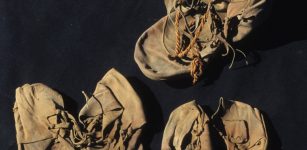 Unsolved Ancient Mystery: Why Were These Foreign Shoes Hidden In A Temple?
Archaeology | Mar 29, 2014
Unsolved Ancient Mystery: Why Were These Foreign Shoes Hidden In A Temple?
Archaeology | Mar 29, 2014 -
 Roman Tombs Unearthed In Egypt’s Dakhla Oasis
Archaeology | Jan 28, 2019
Roman Tombs Unearthed In Egypt’s Dakhla Oasis
Archaeology | Jan 28, 2019 -
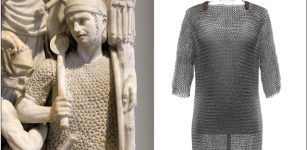 Chain Mail Reveals Roman Soldiers Recycled And Repaired Their Own Armor
Archaeology | Dec 12, 2024
Chain Mail Reveals Roman Soldiers Recycled And Repaired Their Own Armor
Archaeology | Dec 12, 2024 -
 Migration Of Early Humans Out Of Africa Began Thousands Of Years Earlier Than Previously Thought
Archaeology | Dec 18, 2017
Migration Of Early Humans Out Of Africa Began Thousands Of Years Earlier Than Previously Thought
Archaeology | Dec 18, 2017 -
 Pena Molexa (Lunar Boat): Megalithic Corner Dedicated To A Magician Woman Who Knows The Secrets Of Earth And Underworld
Featured Stories | Jul 23, 2023
Pena Molexa (Lunar Boat): Megalithic Corner Dedicated To A Magician Woman Who Knows The Secrets Of Earth And Underworld
Featured Stories | Jul 23, 2023 -
 Hidden Tunnel In Tokat Castle – ‘The Dungeon Of Dracula’ – To Open Soon
News | Sep 22, 2015
Hidden Tunnel In Tokat Castle – ‘The Dungeon Of Dracula’ – To Open Soon
News | Sep 22, 2015 -
 Mabon Festival And The Autumn Equinox Celebrated By Pagans
Ancient Traditions And Customs | Sep 19, 2024
Mabon Festival And The Autumn Equinox Celebrated By Pagans
Ancient Traditions And Customs | Sep 19, 2024 -
 World’s Oldest Burial Site Reveals Homo Naledi Buried Their Dead 100,000 Years Before Humans
Archaeology | Jun 6, 2023
World’s Oldest Burial Site Reveals Homo Naledi Buried Their Dead 100,000 Years Before Humans
Archaeology | Jun 6, 2023 -
 Story Behind The Two Keys On Vatican’s Flag
Ancient History Facts | Feb 28, 2018
Story Behind The Two Keys On Vatican’s Flag
Ancient History Facts | Feb 28, 2018 -
 On This Day In History: Naval Battle Of Rennell Island Fought Off Guadalcanal – On Jan 29, 1943
News | Jan 29, 2017
On This Day In History: Naval Battle Of Rennell Island Fought Off Guadalcanal – On Jan 29, 1943
News | Jan 29, 2017 -
 Sinister Manchac Swamp And The Chilling Curse Of Julia Brown
Featured Stories | Aug 25, 2021
Sinister Manchac Swamp And The Chilling Curse Of Julia Brown
Featured Stories | Aug 25, 2021 -
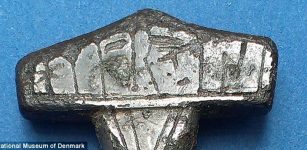 Remarkable Discovery Of Unusual “Hammer Of Thor” Finally Solves An Ancient Mystery
Archaeology | Jul 2, 2014
Remarkable Discovery Of Unusual “Hammer Of Thor” Finally Solves An Ancient Mystery
Archaeology | Jul 2, 2014 -
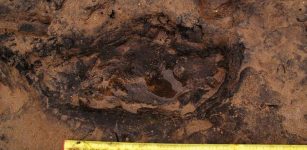 Rare Ancient Human Footprints Found On Gower Peninsula, Wales Are 7,000 Years Old
Archaeology | Mar 8, 2017
Rare Ancient Human Footprints Found On Gower Peninsula, Wales Are 7,000 Years Old
Archaeology | Mar 8, 2017 -
 Discovery Of An Unusually Large Ancient Artifact May Confirm Powerful Myth Of A Mysterious Race
Featured Stories | Oct 8, 2024
Discovery Of An Unusually Large Ancient Artifact May Confirm Powerful Myth Of A Mysterious Race
Featured Stories | Oct 8, 2024 -
 Translated Ancient Text Offers Evidence Of An Unknown Sophisticated Civilization Present In All Corners Of The World
Civilizations | Sep 18, 2022
Translated Ancient Text Offers Evidence Of An Unknown Sophisticated Civilization Present In All Corners Of The World
Civilizations | Sep 18, 2022 -
 Evidence Humans Walked The Great Plains 18,000 Years Ago May Have Been Found – Archaeologists Say
Archaeology | Mar 14, 2022
Evidence Humans Walked The Great Plains 18,000 Years Ago May Have Been Found – Archaeologists Say
Archaeology | Mar 14, 2022 -
 Ancient Manuscript In Museum Reveals Discovery Of Objects Unknown To Modern Science – Inside The Chamber – Part 1
Featured Stories | Apr 8, 2021
Ancient Manuscript In Museum Reveals Discovery Of Objects Unknown To Modern Science – Inside The Chamber – Part 1
Featured Stories | Apr 8, 2021 -
 Pharaonic Water Wells Discovered For The First Time Near ‘Horus Road’ In Sinai, Egypt
Archaeology | Mar 1, 2022
Pharaonic Water Wells Discovered For The First Time Near ‘Horus Road’ In Sinai, Egypt
Archaeology | Mar 1, 2022 -
 Paracelsus: Physician, Alchemist, Philosopher Well Ahead Of His Time
Featured Stories | Apr 28, 2016
Paracelsus: Physician, Alchemist, Philosopher Well Ahead Of His Time
Featured Stories | Apr 28, 2016 -
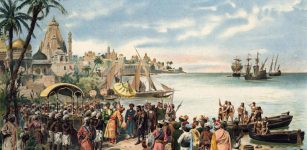 Riddle Of The Two Calicuts And How We Got History Wrong
Archaeology | Jan 20, 2023
Riddle Of The Two Calicuts And How We Got History Wrong
Archaeology | Jan 20, 2023

